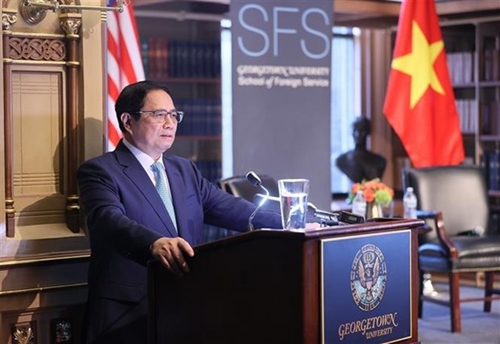In his speech, Pham Minh Chinh said that such challenges related to population aging, non-traditional security like climate change, epidemics, food, water resources, energy, transnational crime, and cybercrime are developing fiercely, causing serious consequences, while the global economy is facing many headwinds.
    |
 |
|
Prime Minister Pham Minh Chinh delivers policy speech at Georgetown University. |
According to the PM, the world is facing two choices: passively accepting challenges and risks at a very high price, or proactively adapting to, taking advantage of opportunities, solving challenges, and taking peace, stability and development cooperation as goals, the U.N. Charter and international law as the foundation, and dialogue and collaboration as tools.
In particular, Vietnam chooses the second choice and hopes its partners also choose it, Pham Minh Chinh stated.
Accordingly, Vietnam chooses the basic foundations to develop the country, with the goal of becoming a developing country with modern industry and high average income by 2030, and a developed, high-income country by 2045.
To that end, Vietnam is speeding up industrialization and modernization, building a socialist democracy, a socialist-oriented rule-of-law state, a socialist-oriented market economy, and advanced culture rich in national identity.
In addition, Vietnam implements a foreign policy of independence, self-reliance, peace, friendship, cooperation and development, diversification, multilateralization, and pro-active, positive and comprehensive international integration, and being a friend, a trusted partner, and an active and responsible member of the international community, said Pham Minh Chinh.
Regarding the Vietnam - U.S. relations, the Vietnamese leader recalled U.S. President Joe Biden’s State visit to Vietnam on September 10-11, during which the two countries upgraded their relationship framework to a comprehensive strategic partnership for peace, cooperation and sustainable development, thus opening a new stage of development for bilateral cooperation.
He suggested the two sides focus on concretizing the upgrade into specific strategies, programs, action plans, projects and business cooperation activities.
The two countries need to strengthen mutual understanding, political trust between their leaders, politicians and people, and define economic, trade and investment collaboration as the main driving force and “eternal engine” to promote bilateral relations.
Vietnam hopes the U.S. to support it in successfully implementing three strategic breakthroughs in institutional improvement, human resources development, and the building of a concerted and modern infrastructure system, thereby contributing to realizing the orientation of building “a strong, independent, self-reliant and prosperous Vietnam” as desired by both sides.
The U.S. should pay more attention to and practically support Vietnamese businesses to access advanced technology and modern governance, develop digital economy, green economy and circular economy, and encourage and create favorable conditions for U.S. firms to invest in developing big projects, especially in manufacturing and expanding supply chains in Vietnam.
For its part, Vietnam is willing to exchange and coordinate to create favorable conditions for the U.S.’s economic, trade and investment cooperation in Vietnam.
Regarding Vietnam’s participation in the fight against climate change, PM Pham Minh Chinh affirmed that the country has been exerting efforts to respond to climate change, including implementing its commitment to achieving net zero emissions by 2050, and considering people as both the center, subject, goal, driving force and resource in this fight.
Source: VNA